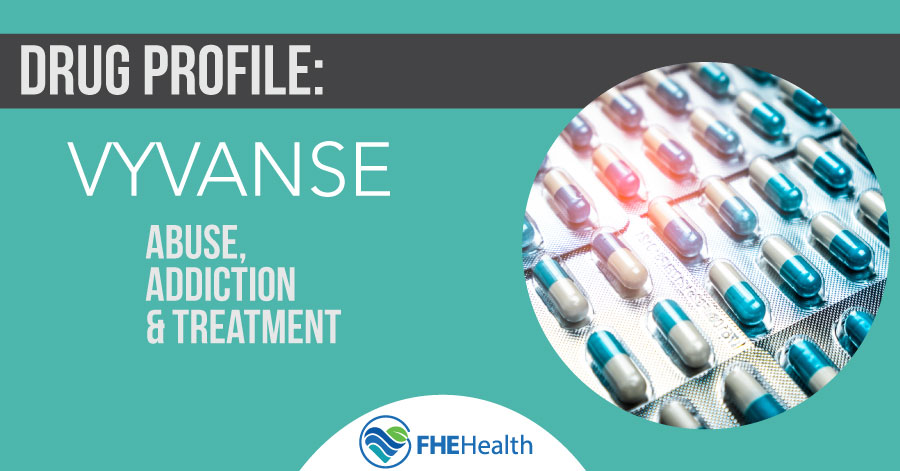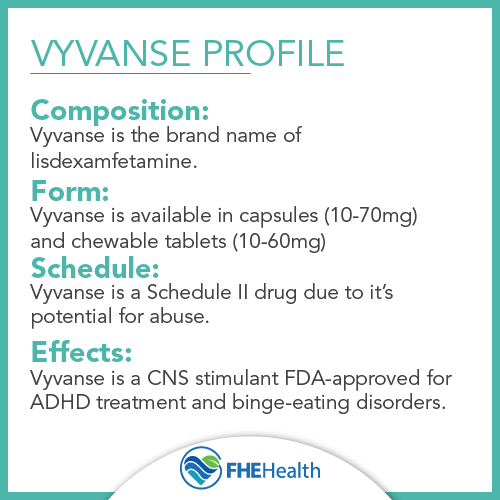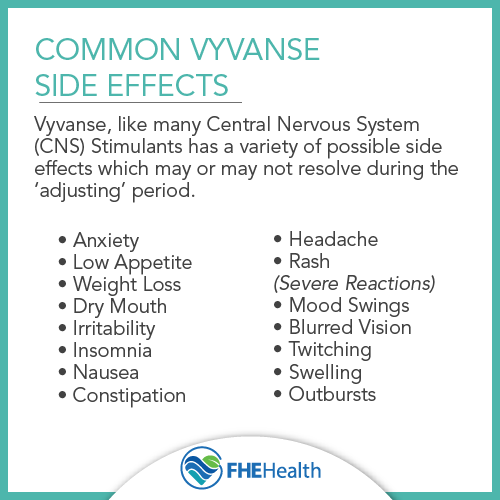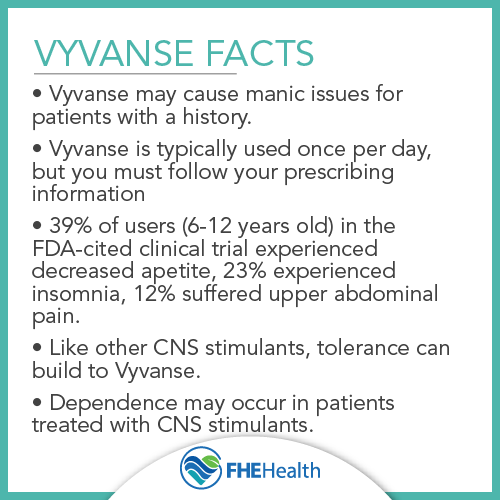
What is Vyvanse?
Vyvanse is a prescription drug that is typically prescribed for treating attention deficit hyperactivity disorder (ADHD) symptoms. It is a central nervous system stimulant and controlled substance. Vyvanse is approved for use by the FDA for individuals aged six and up. Some doctors and patients prefer this drug to Adderall, which is also a treatment for ADHD, because its effects last longer. However, like Adderall, Vyvanse can be habit-forming and is subject to abuse. Chemically, amphetamine-based prescription drugs are similar to crystal meth. Although Vyvanse contains an inactive amphetamine compound, it converts to “active” when metabolized by the body. Like other controlled substances, patients must take the medication exactly as prescribed; abusing this substance can lead to addiction.
Introduction to Vyvanse
 Vyvanse (lisdexamfetamine in generic form) is mainly prescribed by doctors to patients with ADHD. Sometimes it is prescribed to adults who have serious binge-eating disorders. However, Vyvanse is not approved to treat obesity or to promote weight loss. Some doctors favor Vyvanse for ADHD over other amphetamine-based medications like Adderall and Ritalin, because it tends to reduce symptoms longer and it is less prone to abuse because of its slower metabolization. Patients taking Vyvanse don’t have to take it as often as other stimulant medications, and this reduced dosing decreases the risk for abuse. However, the drug is classified by the Drug Enforcement Administration as a Schedule II controlled substance.
Vyvanse (lisdexamfetamine in generic form) is mainly prescribed by doctors to patients with ADHD. Sometimes it is prescribed to adults who have serious binge-eating disorders. However, Vyvanse is not approved to treat obesity or to promote weight loss. Some doctors favor Vyvanse for ADHD over other amphetamine-based medications like Adderall and Ritalin, because it tends to reduce symptoms longer and it is less prone to abuse because of its slower metabolization. Patients taking Vyvanse don’t have to take it as often as other stimulant medications, and this reduced dosing decreases the risk for abuse. However, the drug is classified by the Drug Enforcement Administration as a Schedule II controlled substance.
What Are Side Effects of Vyvanse?
Unfortunately, Vyvanse can interact with some medications, so it’s important to avoid taking it with other drugs unless you have the consent of your doctor. Vyvanse can also interact with vitamin C. The acidity in vitamin C-containing foods can reduce the effectiveness of the drug, so patients must be mindful about how much vitamin C they ingest. Also, some patients taking this drug report some common side effects that include:
- Dry mouth
- Loss of appetite
- Weight loss
- Irritability
- Anxiety
- Insomnia
- Nausea
- Feeling jittery
In some cases, individuals taking this drug have experienced more serious side effects that include:
- Heart problems (i.e. increased heart rate, chest pain)
- Trouble breathing
- Numbness
- Hallucinations
- Paranoia
Doctors avoid prescribing this medication to patients with known heart problems or irregularities because of its association with heart-related side effects.
 Vyvanse works by altering chemicals in the brain. Specifically, it increases norepinephrine and dopamine levels. Increasing these chemicals helps people achieve more focus; patients enjoy improvements in their attention span. The drug also helps users control their impulsive behavior and hyperactivity. Typically, the full effectiveness of the drug cannot be felt for a few weeks of use.
Vyvanse works by altering chemicals in the brain. Specifically, it increases norepinephrine and dopamine levels. Increasing these chemicals helps people achieve more focus; patients enjoy improvements in their attention span. The drug also helps users control their impulsive behavior and hyperactivity. Typically, the full effectiveness of the drug cannot be felt for a few weeks of use. Individuals who are abusing this drug or who are addicted to it should know that help is available. Once an addiction has set in, there is no cure except for abstinence. The medical community regards substance addiction as a chronic condition: While it can be effectively managed (with abstinence), it is likely to progress in severity without treatment.
Individuals who are abusing this drug or who are addicted to it should know that help is available. Once an addiction has set in, there is no cure except for abstinence. The medical community regards substance addiction as a chronic condition: While it can be effectively managed (with abstinence), it is likely to progress in severity without treatment.





